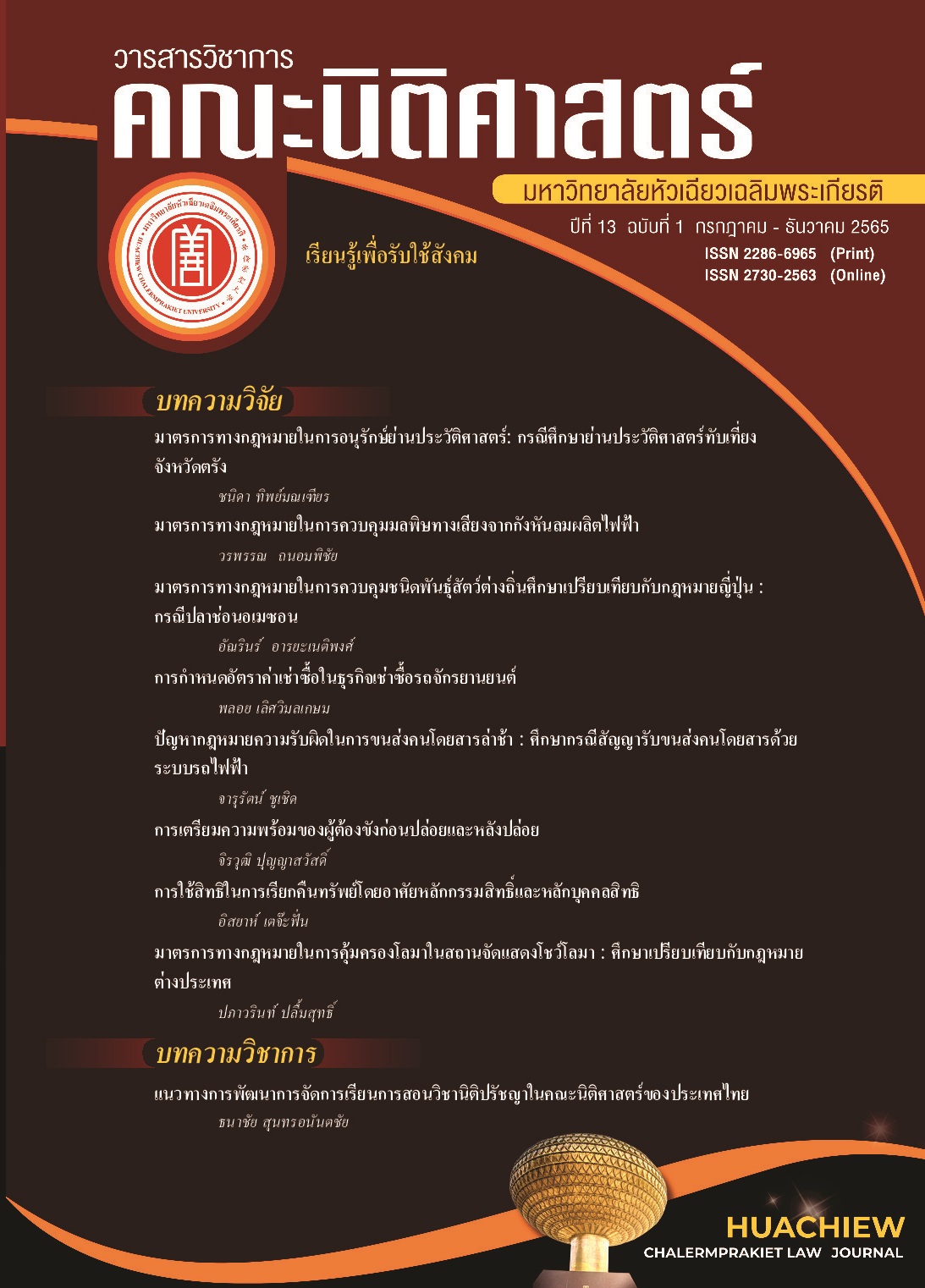Exercise of the Right to Recovery by Virtue of Ownership and Personal Rights
Keywords:
ownership, unjust enrichment, jus in rem, jus in personam, follow and recoverAbstract
The presence, in the law, of several provisions on rights to recovery of property gives rise to difficulty in the interpretation and application of law in each individual case, simply because a party may avail himself of legal protection scattered in several provisions of law. In this regard, a party may seek protection concurrently by virtue of both a right in rem and a right in personam. Hence, there arises the overlapping exercise of rights, whereby the right to claim restitution of property on the ground of the obligation concerned overlaps with the right to claim recovery of property in reliance on ownership. This difficulty is indeed of both theoretical and practical significance in litigation ex casu for recovering property both on the ground of ownership and on the ground of unjust enrichment simultaneously.
A thorough investigation of the concept regarding subsidiarity of unjust enrichment claims in Thai law in comparison with foreign laws, indeed French law and German law, reveals that the order in which rights can be exercised is neither specifically laid down by provisions of law nor established by decisions of Courts. The principle of unjust enrichment in Thai law is akin, in essence, to the German counterpart – in that an unjust enrichment claim is not a subsidiary claim and can, in no wise, preclude the right to recover property on any other available grounds. The claimant can elect to exercise a right on a ground which appears more favourable to him, taking into account conditions and restrictions to which the exercise of the right concerned is subjected.
The exercise of rights for restitution of property by virtue of multiple grounds has thus far produced undesirable impacts on lines of decisions of Thai Courts. In effect, provisions of law also engender such overlapping effect. In particular, where an owner of the property exercises the right to follow and recover his property by virtue of ownership under section 1336 of the Civil and Commercial Code, a question arises as to whether section 1376 of the Code, which provides that the provisions on unjust enrichment shall apply mutatis mutandis, will be called into play as well. If so, there exists the apparent overlay between restitution on the basis of ownership and restitution on the ground of obligation-based unjust enrichment. A historical survey into law drafting as well as the need to protect persons acting in good faith leads to the author’s view that section 1376, as a provision in property law, should also apply when a claim of restitution is made towards property, with the result therefore that a bona fide possessor of property, against whom an action is brought by a legitimate owner for its restitution, is not required to return fruits accruing on such property as the possessor is afforded protection available under section 1376 in conjunction with section 415 of the Code.
Exploration of decisions of the Supreme Court of Thailand in relation to the exercise of the right to restitution reveals several theoretical inconsistencies. In effect, such inconsistencies may also be prompted by the fact that the pursuit of litigation by virtue of ownership presents a greater favour to the claimant in terms of legal prescription, in particular, where it is not feasible to bring an action within a period of prescription fixed by law for making claims on other grounds. However, it is submitted by the author that the right to follow and recover property under section 1336 should be pursued only when the property in question is exactly specified and remains in the possession of the person against whom the claim is made for restitution. Extensive interpretation by the Court that a restitution claim on the ground of ownership can also be pursued where the property in question has been converted into money or where the value of the property is sought as a recompense is simply conceptually untenable, as such interpretation confusingly brings the concept regarding a right in personam into the realm of the right in rem concept.
References
จิตติ เจริญฉ่ำ, “ฎีกาวิเคราะห์ การคืนลาภมิควรได้ที่ไม่ได้อะไรคืนเลย” (2533) 2:13 วารสารอัยการ 13.
พระยามานวราชเสวี, บันทึกคำสัมภาษณ์พระยามานวราชเสวี (ปลอด วิเชียร ณ สงขลา) (กรุงเทพมหานคร: วิญญูชน, พิมพ์ครั้งที่ 2, 2557).
วศุ ศิริมหาพฤกษ์, “ผลผูกพันของคำพิพากษาในไทย:ศึกษากรณีแนวบรรทัดฐานคำพิพากษาศาลฎีกา” (2557) 4:2 วารสารคณะนิติศาสตร์ มหาวิทยาลัยหัวเฉียวเฉลิมพระเกียรติ 17.
โสภณ รัตนากร, "การฟ้องเรียกทรัพย์คืนมีอายุความหรือไม่" (2538) 42:1 ดุลพาห 15.
Andreas Rahmatian, A Comparison of German Moveable Property Law and English Personal Property Law (16 October 2020) German law archive < https://germanlawarchive.iuscomp.org/? p=340>.
Daniel Friedmann, “Unjust Enrichment Pursuance of Self-Interest and the Limits of Free Riding” (2003) 36:1 Loyola of Angeles Law Review 831.
John Bell, Sophie Boyron and Simon Whittaker, Principles of French Law (Oxford: Oxford University Press, 2008).
Mary-Rose McGuire, “National Report on the Transfer of Movables in Germany” in Wolfgang Faber (ed.), National Report on the Transfer of Movables in Europe Volume 3: Germany, Greece, Lithunia, Hungary (München: Sellier, 2010) 1.
Monika Hinteregger, "The Protection of Property Rights" in Sjef van Erp, Bram Akkermans (ed.), Cases, Materials and Text on Property Law (Oxford: Hart Publishing, 2012) 97.
Downloads
Published
How to Cite
Issue
Section
License
Copyright (c) 2022 Huachiew Chalermprakiet Law Journal

This work is licensed under a Creative Commons Attribution-NonCommercial-NoDerivatives 4.0 International License.
บทความหรือข้อความคิดเห็นใด ๆ ที่ปรากฏในวารสารฉบับนี้เป็นวรรณกรรมของผู้เขียนโดยเฉพาะ คณะนิติศาสตร์มหาวิทยาลัยหัวเฉียวเฉลิมพระเกียรติ และกองบรรณาธิการไม่มีส่วนรับผิดชอบหรือไม่จำเป็นต้องเห็นด้วยกับข้อคิดเห็นนั้น แต่ประการใด








